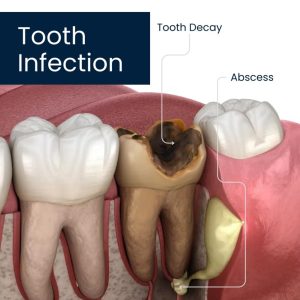 We often associate chronic illnesses with poor diet, lack of exercise, smoking, and obesity. However, research shows hidden tooth infections can also contribute to heart disease, endocarditis, pneumonia, autoimmune disorders, and dementia.
We often associate chronic illnesses with poor diet, lack of exercise, smoking, and obesity. However, research shows hidden tooth infections can also contribute to heart disease, endocarditis, pneumonia, autoimmune disorders, and dementia.
Mouth infections tucked away beneath crowns, implants, root canals, tooth sockets, or jaw recesses are often difficult to detect due to lack of symptoms. In fact, up to 1 in 4 people could possess a hidden tooth infection and not even know it! Getting regular examinations from a qualified dental practitioner is crucial to making sure hidden infections don’t worsen over time and increase your risk of chronic disease.
Below are some serious health issues that the latest research has correlated with tooth infections.
1. Heart Disease
A study from the University of Helsinki found that people with undiagnosed root infections are 2.7 times more likely to develop acute coronary syndrome. Bacteria and inflammation from the infection can spread through the body, increasing the risk of heart disease.
2. Endocarditis
Endocarditis is a rare but serious condition where bacteria from gum disease infect the heart, causing inflammation in its valves and muscles. Researchers studying infective endocarditis found that bacteria in tooth plaque multiplies and causes gum disease, leading to bleeding and widespread bacterial infection. People at high risk may need antibiotics before dental work to help prevent this.
3. Pneumonia
Yale University School of Medicine reearches discovered that changes in oral health can increase pneumonia risk. Symptoms like bleeding gums, loose teeth, and bad breath may indicate a problem. Since pneumonia can be fatal in 5% of cases, early detection is key.
4. Autoimmune Disorders
A 30-year analysis of Swedish patients found a correlation between oral health and autoimmune disorders. Subjects with a higher plaque index were more likely to develop an autoimmune disorder over a 30-year period. Autoimmune issues included diabetes, rheumatic disease, Henoch- Schönlein purpura, and ulcerative colitis. Of those studied, 46% of the people with autoimmune disease were missing anywhere from one to six teeth.
5. Dementia
A 30 year Swedish study published in the Journal of the American Geriatric Society found that poor oral health is linked to autoimmune disorders like diabetes, rheumatoid disease, and ulcerative colitis. Nearly half of the participants with autoimmune diseases were missing 1–6 teeth.
At Innovative Implant and Oral Surgery in Bucks County, our highly trained dentists perform full oral health examinations at every visit, so you are never left in the dark with regard to your health. Contact us to schedule your next visit.
Additional resources:
